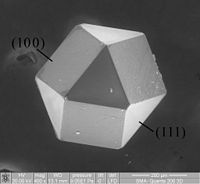
Nanoalloy Materials for Chemical Catalysis.
Sign Up to like & getrecommendations! Published in 2018 at "Advanced materials"
DOI: 10.1002/adma.201705698
Abstract: Nanoalloys (NAs), which are distinctly different from bulk alloys or single metals, take on intrinsic features including tunable components and ratios, variable constructions, reconfigurable electronic structures, and optimizable performances, which endow NAs with fascinating prospects… read more here.
Keywords: materials chemical; nanoalloy materials; chemical catalysis;

3D direct ink printed materials for chemical conversion and environmental remediation applications: a review
Sign Up to like & getrecommendations! Published in 2023 at "Journal of Materials Chemistry A"
DOI: 10.1039/d2ta08922j
Abstract: 3D printing technologies and continuous flow microreaction systems are rapidly gaining attention in the domain of heterogeneous catalysis. read more here.
Keywords: direct ink; ink printed; conversion environmental; printed materials ... See more keywords

Dual adaptive sampling and machine learning interatomic potentials for modeling materials with chemical bond hierarchy
Sign Up to like & getrecommendations! Published in 2021 at "Physical Review B"
DOI: 10.1103/physrevb.104.094310
Abstract: The development of reliable and flexible machine learning based interatomic potentials (ML-IPs) is becoming increasingly important in studying the physical properties of complex condensed matter systems. Besides the structure descriptor model for total energy decomposition,… read more here.
Keywords: chemical bond; machine learning; materials chemical; interatomic potentials ... See more keywords

Hydrophobization of Inorganic Materials by Chemical Modification of the Surface
Sign Up to like & getrecommendations! Published in 2020 at "Russian Journal of Applied Chemistry"
DOI: 10.1134/s1070427220010012
Abstract: General relationships of the hydrophobization of oxide and metal materials by chemical modification of the surface are discussed. Compounds containing an alkyl or fluoroalkyl substituent and a functional (anchor) group capable of chemical interaction with… read more here.
Keywords: materials chemical; surface; chemical modification; hydrophobization ... See more keywords